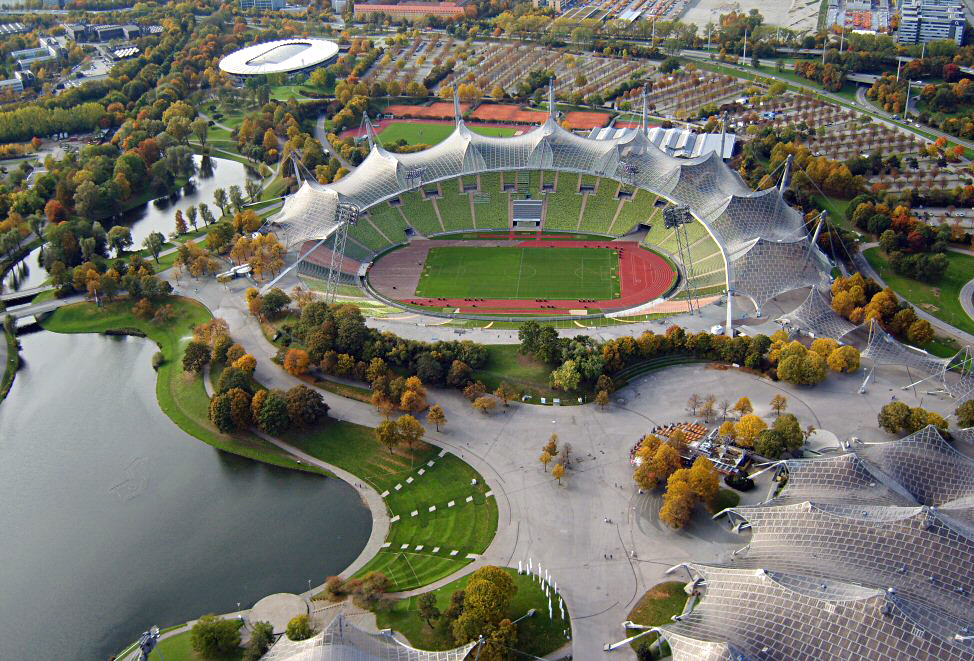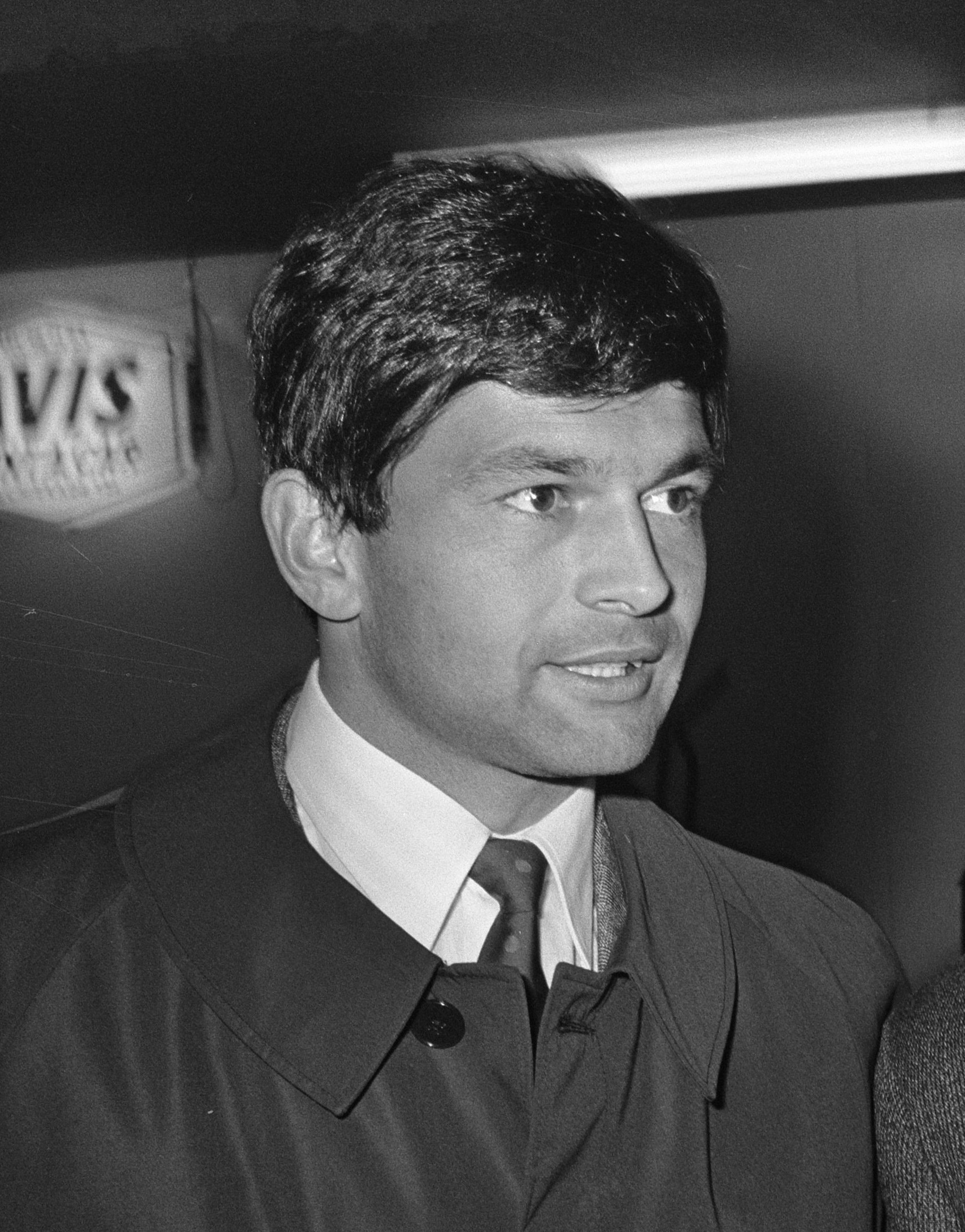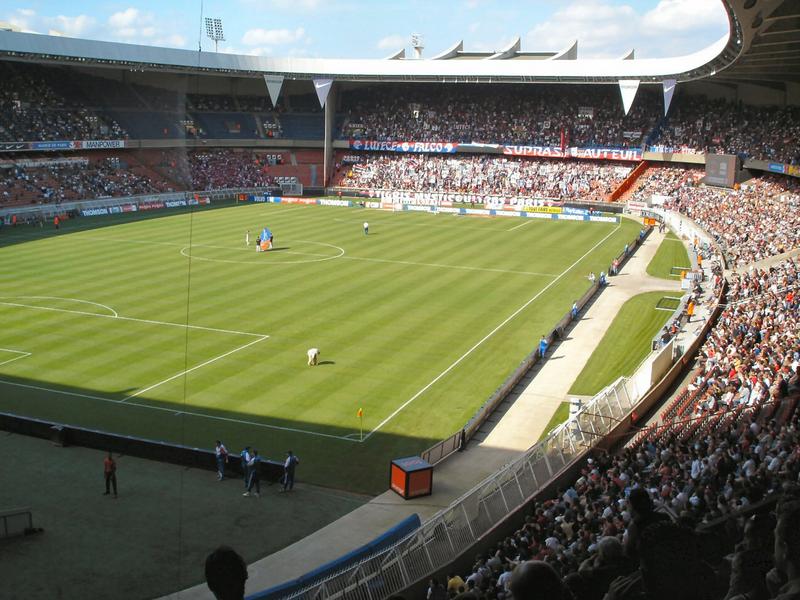|
Mike England
Harold Michael England (born 2 December 1941) is a Welsh former footballer and manager. Playing career Playing as a central defender, England began his career at Blackburn Rovers in 1959, before moving to Tottenham Hotspur in July 1966, ultimately winning four major trophies: the FA Cup in 1967, the UEFA Cup in 1972, and the League Cup in 1971 and 1973. He made 44 international appearances for Wales over twelve years, scoring 4 goals. He was the youngest ever Wales permanent captain for many years, until superseded by Aaron Ramsey in 2011. Management career He later managed the Wales national team from March 1980 to February 1988. His reign as manager was marked by a series of frustrations, as a team of limited resources, but with talented players such as Neville Southall, Ian Rush, Mark Hughes and Mickey Thomas, very narrowly missed out on qualification to a series of major tournaments, including the 1982, and 1986 FIFA World Cups. Perhaps most agonisingly, Wales only ... [...More Info...] [...Related Items...] OR: [Wikipedia] [Google] [Baidu] |
Order Of The British Empire
The Most Excellent Order of the British Empire is a British order of chivalry, rewarding valuable service in a wide range of useful activities. It comprises five classes of awards across both civil and military divisions, the most senior two of which make the recipient either a Orders, decorations, and medals of the United Kingdom#Modern honours, knight if male or a dame (title), dame if female. There is also the related British Empire Medal, whose recipients are affiliated with the order, but are not members of it. The order was established on 4 June 1917 by King George V, who created the order to recognise 'such persons, male or female, as may have rendered or shall hereafter render important services to Our Empire'. Equal recognition was to be given for services rendered in the UK and overseas. Today, the majority of recipients are UK citizens, though a number of Commonwealth realms outside the UK continue to make appointments to the order. Honorary awards may be made to cit ... [...More Info...] [...Related Items...] OR: [Wikipedia] [Google] [Baidu] |
Ian Rush
Ian James Rush (born 20 October 1961) is a Welsh former professional association football, footballer who played as a Forward (association football), forward. He is regarded as one of the best strikers of all time and one of the best Welsh players in the history of the sport. At club level Rush played for Liverpool F.C., Liverpool from 1980 to 1987 and 1988–1996. Additionally, he is the club's List of Liverpool F.C. records and statistics#Top goalscorers, all-time leading goalscorer, having scored a total of 346 goals in all competitions at the club. He also holds the records for being the highest goalscorer in the history of the EFL Cup and the finals of the FA Cup. At international level, Rush made 73 appearances for the Wales national football team and remained the Wales national football team#Top goalscorers, record goalscorer with 28 goals between 1980 and 1996, until the record was broken by Gareth Bale in 2018. Regarded as one of Liverpool's greatest ever players, Rush c ... [...More Info...] [...Related Items...] OR: [Wikipedia] [Google] [Baidu] |
1970–71 Football League Cup
The 1970–71 Football League Cup was the 11th season of the Football League Cup, a knock-out competition for England's top 92 football clubs. The tournament started on 17 August 1970 and ended with the final at Wembley on 27 February 1971. Tottenham Hotspur won the tournament after defeating Aston Villa in the final at Wembley Stadium, London. This was to be the last season in which it wasn't compulsory to enter the tournament. The only team who did not enter in 1970–71 was Everton, the previous season's league champions. After 1971–72 entry to the tournament became compulsory. Calendar Of the 91 teams, 37 received a bye to the second round (teams ranked 2nd–38th in the 1969–70 Football League) and the other 54 played in the first round. Semi-finals were two-legged. First round Ties Replays Second round Ties Replays Second Replay Third round Ties Replays Fourth round Ties Replays Fifth Round Ties Replays Semi-finals First leg Second leg ... [...More Info...] [...Related Items...] OR: [Wikipedia] [Google] [Baidu] |
Football League Cup
The English Football League Cup, often referred to as the League Cup and currently known as the Carabao Cup for sponsorship reasons, is an annual Single-elimination tournament, knockout competition in men's domestic football in England. Organised by the English Football League (EFL), it is open to any football club (association football), club within the top four levels of the English football league system (92 clubs in total) comprising the top-level Premier League, and the three divisions of the English Football League's own league competition (EFL Championship, Championship, EFL League One, League One and EFL League Two, League Two). First held in 1960–61 Football League Cup, 1960–61 as the Football League Cup, it is one of two major domestic knockout trophies in English football, alongside the FA Cup, and one of the three top-tier domestic football competitions in England, alongside the Premier League and FA Cup. It concludes in late-February, long before the other tw ... [...More Info...] [...Related Items...] OR: [Wikipedia] [Google] [Baidu] |
1966–67 FA Cup
The 1966–67 FA Cup was the 86th season of the world's oldest football cup competition, the Football Association Challenge Cup, commonly known as the FA Cup. Tottenham Hotspur won the competition for the fifth time, beating Chelsea 2–1 in the first all-London final. The game was played at Wembley. Matches were scheduled to be played at the stadium of the team named first on the date specified for each round, which was always a Saturday. Some matches, however, might be rescheduled for other days if there were clashes with games for other competitions or the weather was inclement. If scores were level after 90 minutes had been played, a replay would take place at the stadium of the second-named team later the same week. If the replayed match was drawn further replays would be held until a winner was determined. If scores were level after 90 minutes had been played in a replay, a 30-minute period of extra time would be played. Calendar Qualifying rounds Most participating clu ... [...More Info...] [...Related Items...] OR: [Wikipedia] [Google] [Baidu] |
UEFA Euro 1988
The 1988 UEFA European Football Championship final tournament was held in West Germany from 10 to 25 June 1988. It was the eighth UEFA European Championship, which is held every four years and supported by UEFA. France national football team, France were the defending champions, but failed to qualify. The tournament crowned Netherlands national football team, the Netherlands as European champions for the first time. Euro 1988 was a rare instance of a major football tournament ending without a single sending-off or goalless draw, nor any knockout matches going to extra time or penalties. This was the final European Championship to feature teams from West Germany national football team, West Germany and the Soviet Union national football team, Soviet Union, as the West and East Germans German reunification, reunified to become Germany in 1990, and the Soviet Union Dissolution of the Soviet Union, disintegrated into 15 countries in 1991. Bid process West Germany won the right to ho ... [...More Info...] [...Related Items...] OR: [Wikipedia] [Google] [Baidu] |
Bulgaria National Football Team
The Bulgaria national football team () represents Bulgaria in men's international Association football, football, and is administered by the Bulgarian Football Union, a member association of UEFA. Bulgaria's best achievements are reaching the final at the Football at the 1968 Summer Olympics, 1968 Football at the Summer Olympics, Summer Olympics and the fourth-place finish at the FIFA World Cup in 1994 FIFA World Cup, 1994. Bulgaria have competed at a total of seven World Cups, debuting in 1962 FIFA World Cup, 1962 and last appearing in 1998 FIFA World Cup, 1998. In addition, they have participated in two UEFA European Championship, European Championships, in UEFA Euro 1996, 1996 and UEFA Euro 2004, 2004, the latter marking their most recent major tournament appearance. The team has also competed at and won three titles in the Balkan Cup. History 1922–1945: early history The Bulgaria national football team was formed in 1922. In 1923, the Bulgarian Football Union was formed a ... [...More Info...] [...Related Items...] OR: [Wikipedia] [Google] [Baidu] |
UEFA Euro 1984 Qualifying Group 4
Standings and results for Group 4 of the UEFA Euro 1984 qualifying tournament. Group 4 consisted of Bulgaria, Norway, Wales and Yugoslavia , common_name = Yugoslavia , life_span = 1918–19921941–1945: World War II in Yugoslavia#Axis invasion and dismemberment of Yugoslavia, Axis occupation , p1 = Kingdom of SerbiaSerbia , flag_p .... Group winners were Yugoslavia, who finished a point clear of second-placed Wales thanks to an injury-time winning goal in the final group match. Final table Results ---- ---- ---- ---- ---- ---- ---- ---- ---- ---- ---- Goalscorers References UEFA Page {{DEFAULTSORT:Euro 4 1982–83 in Welsh ... [...More Info...] [...Related Items...] OR: [Wikipedia] [Google] [Baidu] |
Yugoslavia National Football Team
The Yugoslavia national football team; ; ; represented Yugoslavia in international association football. Although the team mainly represented the pre-war Kingdom of Yugoslavia and the post-war SFR Yugoslavia, various iterations of the state were formally constituted in football, including the: * Kingdom of Serbs, Croats and Slovenes (1918–1929) * Kingdom of Yugoslavia (1929–1945) * Democratic Federal Yugoslavia (1945) * Federal People's Republic of Yugoslavia (1945–1963) * Socialist Federal Republic of Yugoslavia (1963–1992) It enjoyed success in international competition, reaching the semi-finals at the 1930 FIFA World Cup, 1930 and 1962 FIFA World Cups. In 1992, during the Yugoslav wars, the team was suspended from international competition as part of the United Nations sanctions on Yugoslavia. History The first national team was in the kingdom that existed between the two world wars. The Football Federation of what was then the Kingdom of Serbs, Croats and Slove ... [...More Info...] [...Related Items...] OR: [Wikipedia] [Google] [Baidu] |
Ljubomir Radanović
Ljubomir Radanović (Serbian Cyrillic alphabet, Cyrillic: Љубомир Радановић; born 21 July 1960) is a former Yugoslavia, Yugoslav and Montenegro, Montenegrin Association football, footballer who played as a Defender (association football), defender. Club career After starting out with FK Lovćen, Lovćen in the Yugoslav Second League, Radanović moved to Yugoslav First League club FK Partizan, Partizan in the 1981–82 Yugoslav First League, 1981–82 season. He spent the following seven years at the Stadion JNA, collecting a total of 172 league appearances and scoring 15 goals. After leaving his homeland, Radanović would go on to play for Standard Liège in Belgium, OGC Nice, Nice in France, and AC Bellinzona, Bellinzona in Switzerland. International career At international level, Radanović earned 34 caps and scored three goals for Yugoslavia national football team, Yugoslavia between 1983 and 1988. He is best remembered for scoring a dramatic stoppage-time goal ... [...More Info...] [...Related Items...] OR: [Wikipedia] [Google] [Baidu] |
UEFA Euro 1984
The 1984 UEFA European Football Championship final tournament was held in France from 12 to 27 June 1984. It was the seventh UEFA European Championship, a competition held every four years and endorsed by UEFA. At the time, only eight countries took part in the final stage of the tournament, seven of which had to come through the qualifying stage. France national football team, France qualified automatically as hosts of the event; in the tournament led by Michel Platini, who scored nine goals in France's all five matches, which is still the record for goals scored in a single tournament and until 2020 also the record for goals scored by a single player at all tournaments. ''Les Bleus'' won the championship – their first major international title. Bid process The hosting of the event was contested by bids from France and West Germany. The French bid was unanimously selected by the UEFA Executive Committee at a meeting on 10 December 1981. Tournament summary Group matches The ... [...More Info...] [...Related Items...] OR: [Wikipedia] [Google] [Baidu] |
1986 FIFA World Cup
The 1986 FIFA World Cup was the 13th FIFA World Cup, a quadrennial Association football, football tournament for men's senior national teams. It was played in Mexico from 31 May to 29 June 1986. The tournament was the second to feature a 24-team format. Colombia had been originally chosen to host the competition by FIFA but, largely due to economic reasons, was not able to do so, and resigned in November 1982. Mexico was selected as the new host in May 1983, and became the first country to host the World Cup more than once, after previously 1970 FIFA World Cup, hosting the 1970 edition. The World Cup was won by Argentina national football team, Argentina (their second title, after winning in 1978 FIFA World Cup, 1978). Argentina was captained by the 25-year-old Diego Maradona, who played a large part in his team's success by scoring his "The hand of God, Hand of God" goal, as well as another voted the "Argentina v England (1986 FIFA World Cup)#The Goal of the Century, Goal of th ... [...More Info...] [...Related Items...] OR: [Wikipedia] [Google] [Baidu] |




